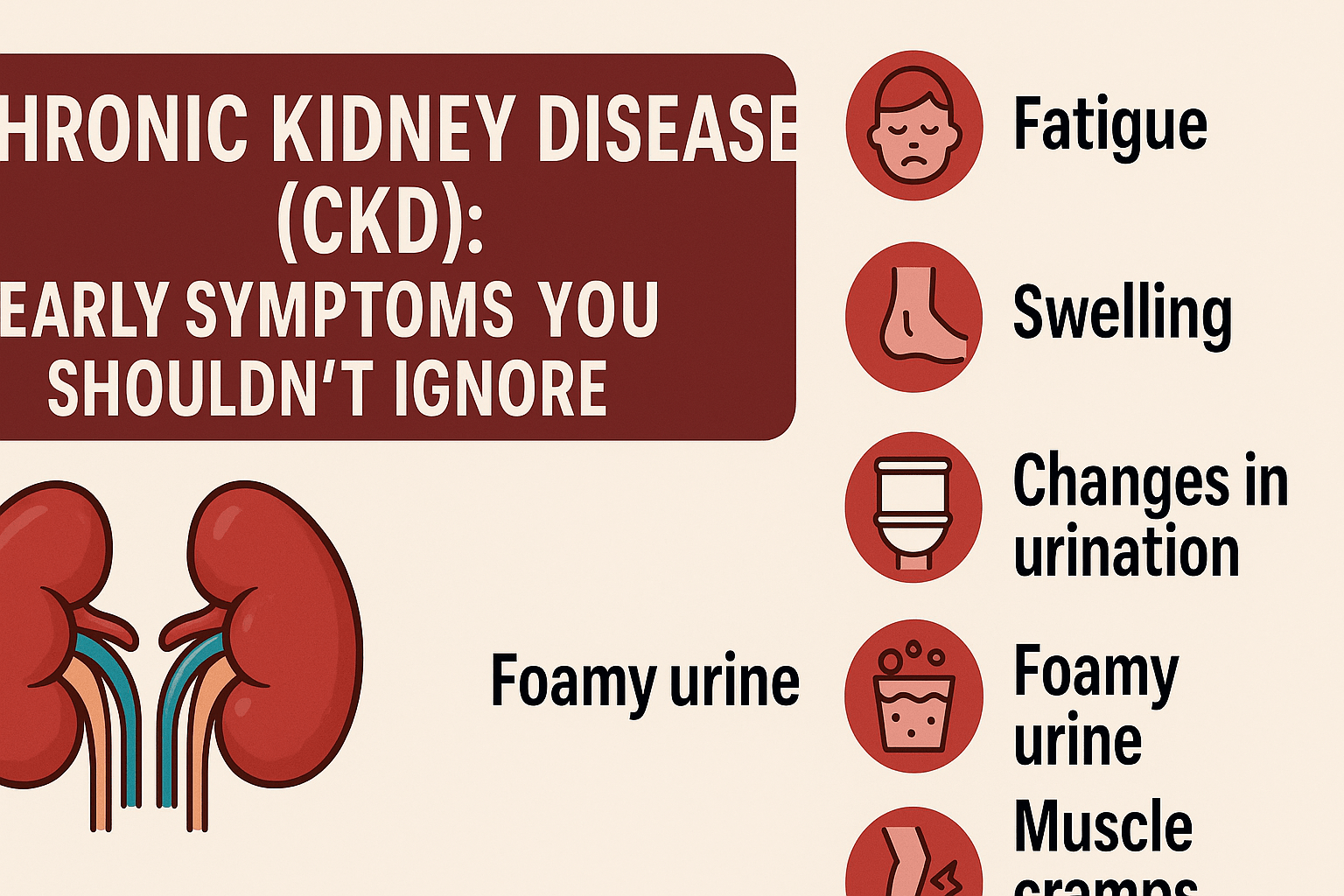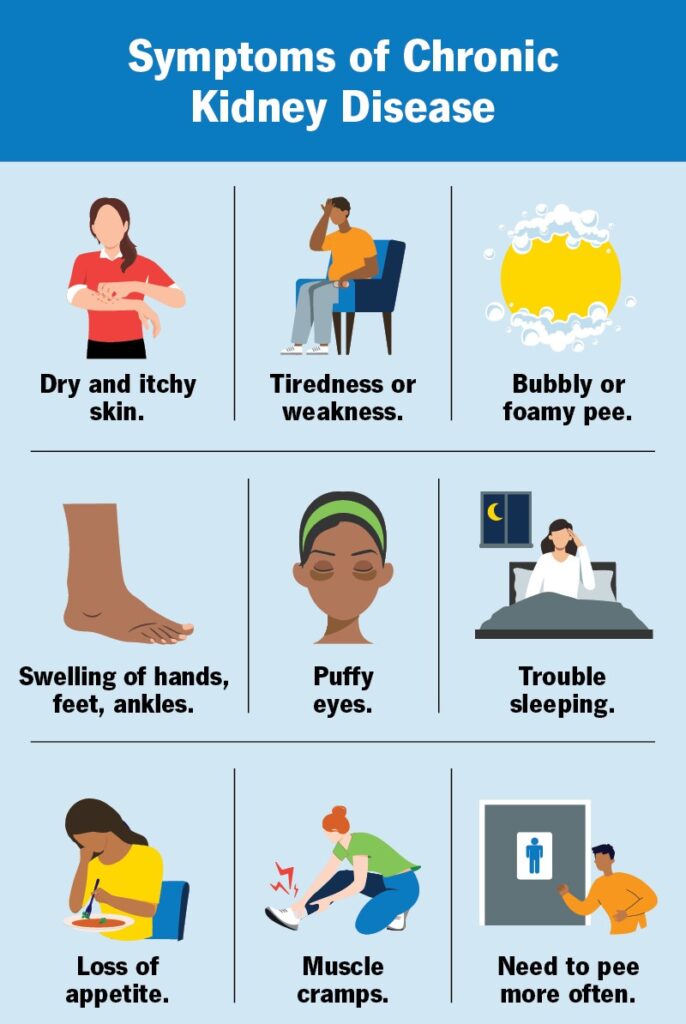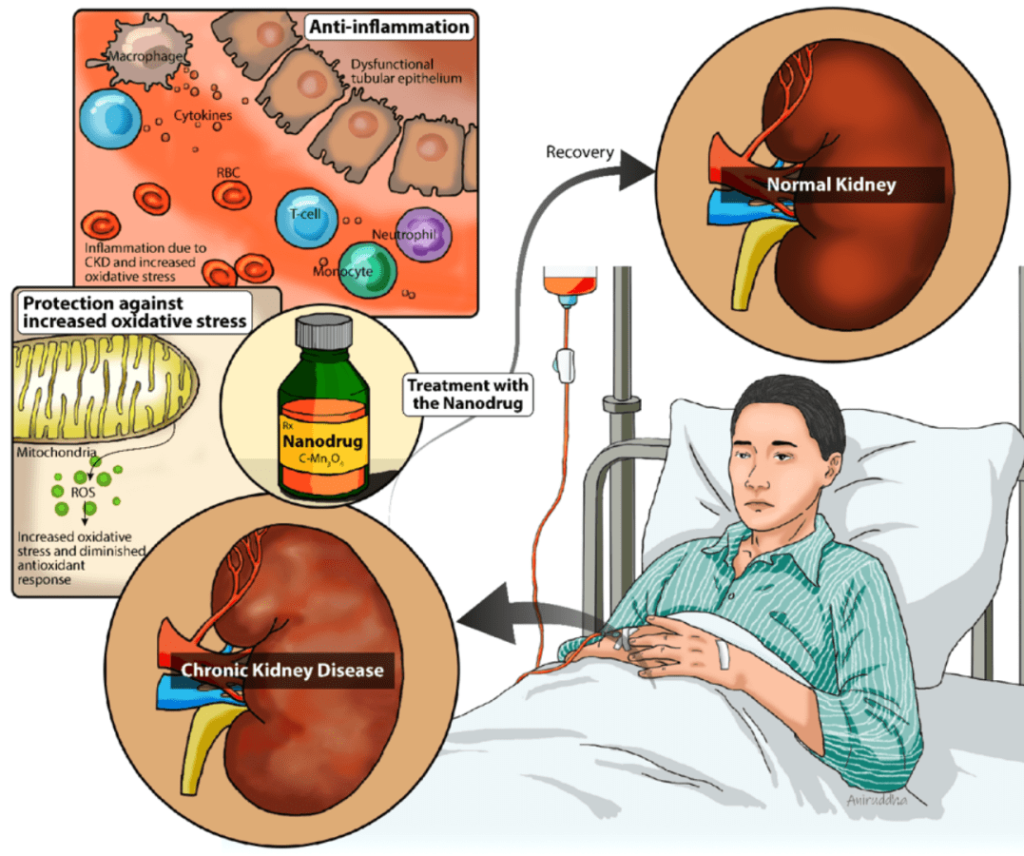Chronic Kidney Disease (CKD) affects millions of people worldwide, and it often creeps in without dramatic symptoms. That’s why noticing Chronic Kidney Disease (CKD) early matters big time. This blog will guide you through early symptoms you shouldn’t ignore—letting you stay ahead and protect your health. And if you’d like more info or expert consultation, visit Care and Cure Hospital anytime. Let’s break this down so it’s easy to get.
What Is Chronic Kidney Disease (CKD)?
Chronic Kidney Disease (CKD) happens when your kidneys lose their filtering ability gradually over time. It’s not about a single bad episode. It’s more like a slow drip. Healthy kidneys filter blood, remove waste, and regulate electrolytes. But if they’re not working right, waste builds up, and your body starts to feel it.
Why it gets tricky? Symptoms early on are subtle. You might feel more tired, or notice small changes in urination, and think, “Meh, it’s nothing.” That’s how CKD sneaks up. Sound confusing? Don’t worry—we’ll explain this step by step.
Why Early Detection Matters
Early detection of Chronic Kidney Disease (CKD) gives you a head start. Catching it early means:
- Slowing progression: Lifestyle changes and treatment can keep you stable.
- Reducing complications: CKD raises the risk of heart disease, bone issues, and high blood pressure.
- Better quality of life: Feeling good matters—even if it sounds obvious.
Ready to dive into the symptoms? Let’s go.
1. Changes in Urination Patterns
When kidneys aren’t filtering well, urination often changes. You might see:
- Increased frequency—especially at night (nocturia). Peeing more often could flag CKD.
- Foamy or bubbly urine—protein leakage turns urine frothy.
- Blood in urine—urine looks pink, red, or cola-colored.
- Reduced amount—you may pee less than usual or feel weak in urine flow.
Sounds ordinary? It might be at first—but paying attention can save kidney function.
2. Persistent Fatigue and Weakness
Feeling wiped out after a day? Happens to everyone. But with CKD, fatigue is persistent, even after rest. Why?
- Waste builds in the blood—making you feel sluggish.
- Anemia often develops—kidneys produce less EPO hormone, so you make fewer red blood cells.
If your fatigue doesn’t match your lifestyle, get it checked. CKD could be at play.
3. Swelling (Edema) in Ankles and Feet
Healthy kidneys regulate fluid. With CKD, salt and water retention cause swelling—especially in the legs, ankles, and feet. You might notice:
- Stiff shoes after a day of walking
- Puffy hands in the morning
- Swollen face or belly in serious cases
Noticed puffiness? Mention it—don’t shrug it off.
4. Skin Itching and Dryness
CKD affects waste and mineral balance in your body. That leads to:
- Persistent itching
- Dry, scaly skin textures
It usually starts mild but can get annoying. Itching that won’t go away? This is one of those early Chronic Kidney Disease (CKD) clues that’s easy to dismiss.
5. Persistent Muscle Cramps
Yes, leg cramps can come from low movement. But in CKD, it’s about electrolyte imbalance, especially low calcium and high phosphate. You might get cramps in the legs or even twitching hands. Mention it. Especially if they show up a lot or don’t respond to typical remedies.
6. Poor Appetite and Unexplained Weight Loss
Waking up with no appetite, feeling full quickly, and losing weight without trying? Waste buildup in CKD can cause nausea and decreased appetite. Over time, this affects nutrition and your overall health. These signs are subtle, but they matter.
7. Trouble Concentrating & Brain Fog
We think of CKD as a kidney thing—but it affects the brain too. Toxin buildup and anemia can cause:
- Trouble focusing
- Memory lapses
- Feeling “off” mentally
If normal tasks feel foggier than usual, talk to your doctor. It might not be just stress.
8. High Blood Pressure (Hypertension)
It’s a chicken-or-egg scenario: CKD can cause high blood pressure— and high blood pressure can worsen kidneys. Either way, if your blood pressure is high, it could be damaging your kidneys. Regular checks are key.
9. Shortness of Breath (Dyspnea)
You might think breathlessness is just about being unfit. But in CKD:
- Fluid buildup from anemia or kidney issues can cause lung congestion.
- That leads to shortness of breath on exertion, or even at rest.
This is another symptom that might get overlooked because it “seems unrelated.”
10. Back Pain or Discomfort
Kidney pain often shows up as dull ache in your back or side, just under the ribcage. It may come and go. If you feel pain near where the kidneys are and it isn’t related to injury—mention it. Most CKD doesn’t cause pain until later, but it’s good to know.
Breaking It Down: How These Symptoms Connect
Let’s connect these dots in simple terms:
- Filtration fails → waste buildup
- Waste + electrolyte imbalance → fatigue, cramps, poor appetite
- Fluid retention → swelling, high BP, shortness of breath
- Anemia + toxins → brain fog, weakness
- Chronic irritations → skin itch, appetite issues
So yeah—many unrelated symptoms can actually be part of the same issue.
How to Get Diagnosed Early
If any combination of these symptoms is new or persistent:
- See your doctor—share what you’ve noticed.
- Get blood tests—kidney function markers like creatinine, eGFR, BUN.
- Urine test—checking for protein, blood, or other abnormalities.
- Imaging (ultrasound)—to look at kidney size, structure, stones, cysts.
- Blood pressure check—a simple yet powerful indicator.
Diagnosing CKD early allows you to manage it before it becomes severe. For accurate testing and caring professionals, visit care and cure hospital.
Treatment & Management Overview
So what happens after diagnosis? Treatment depends on the stage of Chronic Kidney Disease CKD, but typically includes:
- Lifestyle changes: Healthy diet (low-sodium, moderate protein), regular exercise, quitting smoking.
- Blood pressure control: Meds like ACE inhibitors.
- Sugar level control: Especially for diabetic patients.
- Anemia treatment: Supplements to boost red blood cells.
- Bone health focus: Supplements for calcium/phosphate balance.
- Specialist referral: Nephrologist care for advanced stages or complications.
Want expert guidance? Learn more at care and cure hospital
Preventive Measures & Healthy Habits
Even if you don’t have CKD yet, here’s what helps:
- Stay hydrated—but not overdo it; balance is key.
- High blood pressure & sugar—monitor and manage both.
- Watch your weight—healthy BMI helps kidneys.
- Cut salt, reduce processed foods.
- Stay active—daily walks make a difference.
- Avoid OTC pain meds—like NSAIDs; they can hurt kidneys over time.
- Regular health check-ups—especially if you have risk factors like diabetes, hypertension, family history of kidney disease.
When to See a Specialist (Nephrologist)
It’s a good idea to consult a nephrologist if:
- eGFR is less than 60 ml/min/1.73 m² for 3+ months
- Persistent proteinuria or blood in urine
- Difficult-to-control blood pressure
- Rapid symptom progression (swelling, fatigue, breathing issues)
A nephrology team can provide deeper insight and specialized care.
Sounding Like a Real Human? Here’s How
Okay, if you’ve read this far, thanks for hanging in! We aim to make this feel like a friendly chat, not a clinical manual. Slight repetition helps reinforce things—because when it comes to something as important as Chronic Kidney Disease (CKD), it’s worth driving home.
Conclusion
So to recap:
- Chronic Kidney Disease (CKD) can start silently.
- Early symptoms—like urination changes, fatigue, swelling, or itchiness—can be easy to miss.
- Spotting them early means taking action: simple tests, lifestyle shifts, meds.
- That slow-down effect is huge for long-term health.
Feeling unsure? Want tests or expert advice? Feel free to reach out at care and cure hospital Your kidneys do a ton—they deserve your attention. Take the next step today.
FAQs
1. What exactly is Chronic Kidney Disease (CKD)?
CKD means your kidneys lose filtering function over time. It’s common, serious, and often symptom-free early on, so testing is key.
2. Can early-stage Chronic Kidney Disease CKD be reversed?
While CKD isn’t usually reversible, early detection allows management—slowing progression and maintaining quality of life.
3. Which test is best for early Chronic Kidney Disease CKD detection?
Key tests include serum creatinine (eGFR), blood urea nitrogen (BUN), and urine albumin-to-creatinine ratio (UACR). These are simple and effective.
4. Are lifestyle changes really helpful?
Absolutely. Diet, exercise, blood pressure control, and avoiding nephrotoxic meds (like NSAIDs) can significantly delay Chronic Kidney Disease CKD progression.
5. How often should I test my kidneys?
If you have risk factors (diabetes, hypertension, family history), test at least once a year. Without risk factors but with mild symptoms—talk to your doctor.



